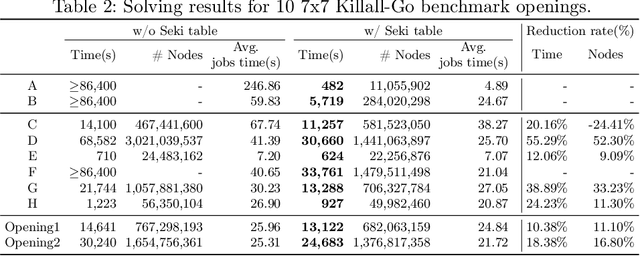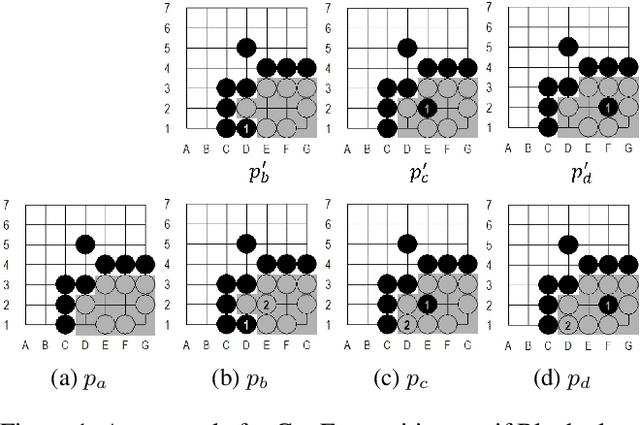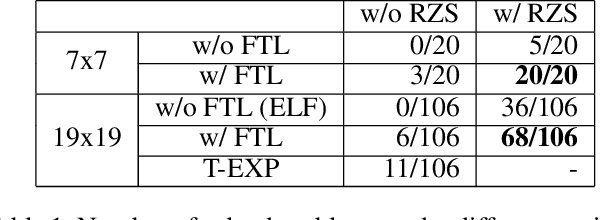Chung-Chin Shih
A Study of Solving Life-and-Death Problems in Go Using Relevance-Zone Based Solvers
Dec 23, 2025Abstract:This paper analyzes the behavior of solving Life-and-Death (L&D) problems in the game of Go using current state-of-the-art computer Go solvers with two techniques: the Relevance-Zone Based Search (RZS) and the relevance-zone pattern table. We examined the solutions derived by relevance-zone based solvers on seven L&D problems from the renowned book "Life and Death Dictionary" written by Cho Chikun, a Go grandmaster, and found several interesting results. First, for each problem, the solvers identify a relevance-zone that highlights the critical areas for solving. Second, the solvers discover a series of patterns, including some that are rare. Finally, the solvers even find different answers compared to the given solutions for two problems. We also identified two issues with the solver: (a) it misjudges values of rare patterns, and (b) it tends to prioritize living directly rather than maximizing territory, which differs from the behavior of human Go players. We suggest possible approaches to address these issues in future work. Our code and data are available at https://rlg.iis.sinica.edu.tw/papers/study-LD-RZ.
Relevance-Zone Reduction in Game Solving
Oct 01, 2025Abstract:Game solving aims to find the optimal strategies for all players and determine the theoretical outcome of a game. However, due to the exponential growth of game trees, many games remain unsolved, even though methods like AlphaZero have demonstrated super-human level in game playing. The Relevance-Zone (RZ) is a local strategy reuse technique that restricts the search to only the regions relevant to the outcome, significantly reducing the search space. However, RZs are not unique. Different solutions may result in RZs of varying sizes. Smaller RZs are generally more favorable, as they increase the chance of reuse and improve pruning efficiency. To this end, we propose an iterative RZ reduction method that repeatedly solves the same position while gradually restricting the region involved, guiding the solver toward smaller RZs. We design three constraint generation strategies and integrate an RZ Pattern Table to fully leverage past solutions. In experiments on 7x7 Killall-Go, our method reduces the average RZ size to 85.95% of the original. Furthermore, the reduced RZs can be permanently stored as reusable knowledge for future solving tasks, especially for larger board sizes or different openings.
Strength Estimation and Human-Like Strength Adjustment in Games
Feb 24, 2025Abstract:Strength estimation and adjustment are crucial in designing human-AI interactions, particularly in games where AI surpasses human players. This paper introduces a novel strength system, including a strength estimator (SE) and an SE-based Monte Carlo tree search, denoted as SE-MCTS, which predicts strengths from games and offers different playing strengths with human styles. The strength estimator calculates strength scores and predicts ranks from games without direct human interaction. SE-MCTS utilizes the strength scores in a Monte Carlo tree search to adjust playing strength and style. We first conduct experiments in Go, a challenging board game with a wide range of ranks. Our strength estimator significantly achieves over 80% accuracy in predicting ranks by observing 15 games only, whereas the previous method reached 49% accuracy for 100 games. For strength adjustment, SE-MCTS successfully adjusts to designated ranks while achieving a 51.33% accuracy in aligning to human actions, outperforming a previous state-of-the-art, with only 42.56% accuracy. To demonstrate the generality of our strength system, we further apply SE and SE-MCTS to chess and obtain consistent results. These results show a promising approach to strength estimation and adjustment, enhancing human-AI interactions in games. Our code is available at https://rlg.iis.sinica.edu.tw/papers/strength-estimator.
Solving 7x7 Killall-Go with Seki Database
Nov 08, 2024



Abstract:Game solving is the process of finding the theoretical outcome for a game, assuming that all player choices are optimal. This paper focuses on a technique that can reduce the heuristic search space significantly for 7x7 Killall-Go. In Go and Killall-Go, live patterns are stones that are protected from opponent capture. Mutual life, also referred to as seki, is when both players' stones achieve life by sharing liberties with their opponent. Whichever player attempts to capture the opponent first will leave their own stones vulnerable. Therefore, it is critical to recognize seki patterns to avoid putting oneself in jeopardy. Recognizing seki can reduce the search depth significantly. In this paper, we enumerate all seki patterns up to a predetermined area size, then store these patterns into a seki table. This allows us to recognize seki during search, which significantly improves solving efficiency for the game of Killall-Go. Experiments show that a day-long, unsolvable position can be solved in 482 seconds with the addition of a seki table. For general positions, a 10% to 20% improvement in wall clock time and node count is observed.
ResTNet: Defense against Adversarial Policies via Transformer in Computer Go
Oct 07, 2024Abstract:Although AlphaZero has achieved superhuman levels in Go, recent research has highlighted its vulnerability in particular situations requiring a more comprehensive understanding of the entire board. To address this challenge, this paper introduces ResTNet, a network that interleaves residual networks and Transformer. Our empirical experiments demonstrate several advantages of using ResTNet. First, it not only improves playing strength but also enhances the ability of global information. Second, it defends against an adversary Go program, called cyclic-adversary, tailor-made for attacking AlphaZero algorithms, significantly reducing the average probability of being attacked rate from 70.44% to 23.91%. Third, it improves the accuracy from 59.15% to 80.01% in correctly recognizing ladder patterns, which are one of the challenging patterns for Go AIs. Finally, ResTNet offers a potential explanation of the decision-making process and can also be applied to other games like Hex. To the best of our knowledge, ResTNet is the first to integrate residual networks and Transformer in the context of AlphaZero for board games, suggesting a promising direction for enhancing AlphaZero's global understanding.
Game Solving with Online Fine-Tuning
Nov 13, 2023Abstract:Game solving is a similar, yet more difficult task than mastering a game. Solving a game typically means to find the game-theoretic value (outcome given optimal play), and optionally a full strategy to follow in order to achieve that outcome. The AlphaZero algorithm has demonstrated super-human level play, and its powerful policy and value predictions have also served as heuristics in game solving. However, to solve a game and obtain a full strategy, a winning response must be found for all possible moves by the losing player. This includes very poor lines of play from the losing side, for which the AlphaZero self-play process will not encounter. AlphaZero-based heuristics can be highly inaccurate when evaluating these out-of-distribution positions, which occur throughout the entire search. To address this issue, this paper investigates applying online fine-tuning while searching and proposes two methods to learn tailor-designed heuristics for game solving. Our experiments show that using online fine-tuning can solve a series of challenging 7x7 Killall-Go problems, using only 23.54% of computation time compared to the baseline without online fine-tuning. Results suggest that the savings scale with problem size. Our method can further be extended to any tree search algorithm for problem solving. Our code is available at https://rlg.iis.sinica.edu.tw/papers/neurips2023-online-fine-tuning-solver.
MiniZero: Comparative Analysis of AlphaZero and MuZero on Go, Othello, and Atari Games
Oct 17, 2023



Abstract:This paper presents MiniZero, a zero-knowledge learning framework that supports four state-of-the-art algorithms, including AlphaZero, MuZero, Gumbel AlphaZero, and Gumbel MuZero. While these algorithms have demonstrated super-human performance in many games, it remains unclear which among them is most suitable or efficient for specific tasks. Through MiniZero, we systematically evaluate the performance of each algorithm in two board games, 9x9 Go and 8x8 Othello, as well as 57 Atari games. Our empirical findings are summarized as follows. For two board games, using more simulations generally results in higher performance. However, the choice of AlphaZero and MuZero may differ based on game properties. For Atari games, both MuZero and Gumbel MuZero are worth considering. Since each game has unique characteristics, different algorithms and simulations yield varying results. In addition, we introduce an approach, called progressive simulation, which progressively increases the simulation budget during training to allocate computation more efficiently. Our empirical results demonstrate that progressive simulation achieves significantly superior performance in two board games. By making our framework and trained models publicly available, this paper contributes a benchmark for future research on zero-knowledge learning algorithms, assisting researchers in algorithm selection and comparison against these zero-knowledge learning baselines.
A Local-Pattern Related Look-Up Table
Dec 22, 2022Abstract:This paper describes a Relevance-Zone pattern table (RZT) that can be used to replace a traditional transposition table. An RZT stores exact game values for patterns that are discovered during a Relevance-Zone-Based Search (RZS), which is the current state-of-the-art in solving L&D problems in Go. Positions that share the same pattern can reuse the same exact game value in the RZT. The pattern matching scheme for RZTs is implemented using a radix tree, taking into consideration patterns with different shapes. To improve the efficiency of table lookups, we designed a heuristic that prevents redundant lookups. The heuristic can safely skip previously queried patterns for a given position, reducing the overhead to 10% of the original cost. We also analyze the time complexity of the RZT both theoretically and empirically. Experiments show the overhead of traversing the radix tree in practice during lookup remain flat logarithmically in relation to the number of entries stored in the table. Experiments also show that the use of an RZT instead of a traditional transposition table significantly reduces the number of searched nodes on two data sets of 7x7 and 19x19 L&D Go problems.
A Novel Approach to Solving Goal-Achieving Problems for Board Games
Dec 05, 2021



Abstract:Goal-achieving problems are puzzles that set up a specific situation with a clear objective. An example that is well-studied is the category of life-and-death (L&D) problems for Go, which helps players hone their skill of identifying region safety. Many previous methods like lambda search try null moves first, then derive so-called relevance zones (RZs), outside of which the opponent does not need to search. This paper first proposes a novel RZ-based approach, called the RZ-Based Search (RZS), to solving L&D problems for Go. RZS tries moves before determining whether they are null moves post-hoc. This means we do not need to rely on null move heuristics, resulting in a more elegant algorithm, so that it can also be seamlessly incorporated into AlphaZero's super-human level play in our solver. To repurpose AlphaZero for solving, we also propose a new training method called Faster to Life (FTL), which modifies AlphaZero to entice it to win more quickly. We use RZS and FTL to solve L&D problems on Go, namely solving 68 among 106 problems from a professional L&D book while a previous program solves 11 only. Finally, we discuss that the approach is generic in the sense that RZS is applicable to solving many other goal-achieving problems for board games.
 Add to Chrome
Add to Chrome Add to Firefox
Add to Firefox Add to Edge
Add to Edge